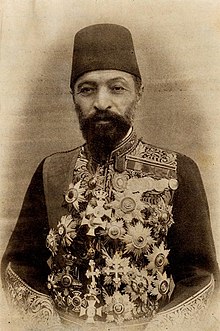| This article includes a list of references, related reading, or external links, but its sources remain unclear because it lacks inline citations. Please help improve this article by introducing more precise citations. (November 2018) (Learn how and when to remove this message) |
| Ahmad Izzat Pasha al-Abid | |
|---|---|
 | |
| Mabeyn-i hümayun ikinci katibi | |
| Monarch | Abdulhamid II |
| Personal details | |
| Born | Ahmad Izzat bin Hawlu al-Abid 1851 Damascus, Ottoman Empire |
| Died | 1924(1924-00-00) (aged 72–73) Cairo, Kingdom of Egypt |
Ahmad Izzat Pasha bin Hawlu Pasha al-Abid (Arabic: أحمد عزت باشا بن هولو باشا العابد, romanized: Aḥmad ʻIzzat Bāshā bin Hawlū Bāshā al-ʻĀbid; Turkish: Holo Paşa'nın oğlu Ahmed İzzet Paşa el-Abid or Abidzade Ahmed İzzet Paşa; 1851–1924), nicknamed Izzat Pasha the Arab (Turkish: Arap İzzet Paşa), was a Syrian entrepreneur who became Second Secretary and confidant of Ottoman Sultan Abdulhamid II. He is considered to have been "one of the most powerful" statesmen during the last decade of Abdulhamid's rule.
Life
Ahmad Izzat al-Abid was born in Damascus. His father was Hawlu Pasha al-Abid. Ahmad Izzat was educated in Beirut. He spoke Arabic, French and Turkish. He moved to Istanbul where he served the Ottoman sultan, Abdulhamid II as an adviser. He left the Ottoman Empire following the Young Turk Revolution in 1908 and moved to London for some time before living in France and Switzerland. He then left for Egypt, where he died in 1924.

Abid accumulated great wealth during his life. He was also a businessman and owned numerous enterprises or buildings including the largest tourist hotel in Syria at the time, the Victoria Hotel in Damascus.
He was the father of Muhammad Ali Bay al-Abid, who served as the first president of the mandatory Syrian Republic.
Notes
- Holo (instead of Hevlu) is a transcription of the Syrian pronunciation of the name هولو (Hawlū).
References
- Dünden bugüne İstanbul ansiklopedisi (in Turkish). Vol. 7. 1993. p. 393.
- ^ Osmanoğlu, Ayşe (1991). Avec mon père le sultan Abdulhamid (in French). Editions L'Harmattan. p. 34. ISBN 9782296241763.
- Hahn, Steven Michael (1998). The Roots of Turkish Nationalism.
Bibliography
- Commins, David Dean (2004). "Abid, Ahmad Izzat al- (1851–1924)". Historical Dictionary of Syria (2nd ed.). Scarecrow Press. pp. 21–22. ISBN 9780810849341.
This Ottoman Empire–related article is a stub. You can help Misplaced Pages by expanding it. |
This article about a Syrian politician is a stub. You can help Misplaced Pages by expanding it. |
- 1851 births
- 1924 deaths
- Syrian businesspeople
- Political people from the Ottoman Empire
- Expatriates from the Ottoman Empire
- Expatriates in the United Kingdom
- Expatriates in France
- Expatriates in Switzerland
- Arab people from the Ottoman Empire
- Mabeyn-i hümayun katipleri
- Ottoman Empire stubs
- Syrian politician stubs